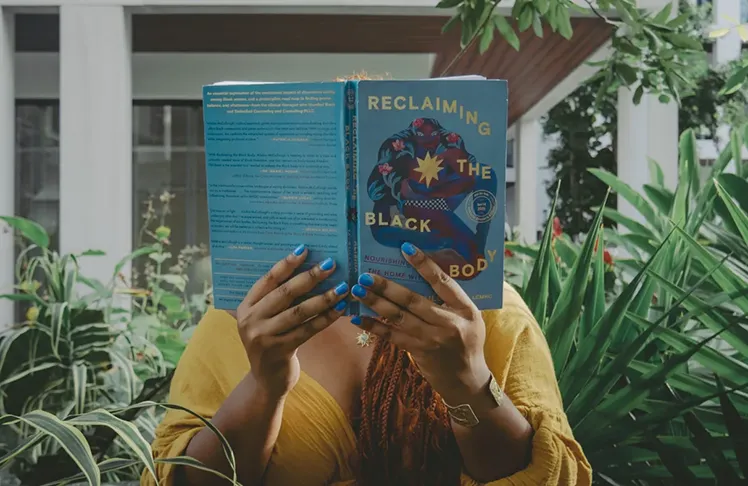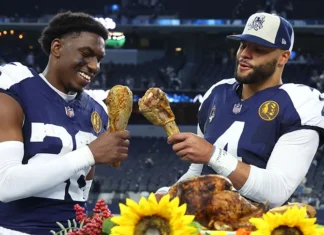
When Alishia McCullough speaks about eating disorders in Black communities, she often encounters surprise – a reaction that perfectly illustrates the problem she’s spent years fighting. Early in her career, McCullough, a licensed clinical mental health therapist who specializes in eating disorders in Black women and femmes, noticed how discourse around eating disorders remains centered on white experiences. So, she made it a point to center Black experiences.
In 2019, she started an Instagram account BlackandEmbodied, to raise awareness of eating disorders in Black communities. Later during the COVID-19 pandemic, McCullough co-founded a movement called Amplify Melanated Voices to recenter the voices of Black practitioners. The #AmplifyMelanatedVoices social media campaign ended up going viral.
Separating her own experience with disordered eating to treat clients wasn’t always easy. But McCullough uses her platform to help Black women and femmes “come back home to their bodies so they can experience true healing and liberation.” She writes about this in her new book, “Reclaiming the Black Body — Nourishing the Home Within,” which is officially being released on Tuesday.
In the book, McCullough breaks down how America’s long history of anti-Black racism shows up in our bodies. She addresses the different ways religion, misogynoir, and patriarchy have made it more difficult for Black women and femmes to access treatment, and why there needs to be more culturally competent mental health care providers for Black women. Below are five main takeaways from the book:
Racism and stress arguably have the largest impact on our health
It’s not just about what you eat. The belief that you can avoid fatness by eating clean or whole foods or vegan or keto or paleo or low carb is a myth. Anti-Black racism has been shown to affect Black folks physical and mental health. As we navigate a system that was invented to neglect us, it’s no surprise many Black Americans experience chronic health illnesses and mental health struggles.
“The impact of stress and trauma from all they had experienced had begun to manifest physically in their bodies as inflammation, illness, autoimmune issues, hypertension, blood sugar issues, chronic health condition, gut issues, skin issues, stress, hair loss, chronic fatigue, sleep issues, and inconsistent eating patterns,” McCullough writes in her book about clients she’s worked with.
For Black women and femmes who are navigating a system that is anti-Black and high stress, to even receive a diagnosis for an eating disorder presents its own challenges. Black women report higher rates of dismissal of care in clinical settings and are often expected to be the strong Black woman, who can withstand any hardship.
These intersectional identities and expectations that many Black women experience can contribute to how they carry their weight and create eating imbalances in their bodies. With a mix of trauma, stress, and anti-Black racism, the body often “keeps the score” of how these experiences are processed.
The way we define health is oversimplified
In American culture and in the medical field, it’s very common to associate weight with the quality of someone’s health. But associating fat and automatically assuming it makes someone unhealthy is not accurate. In McCullough’s book, she pushes back on the common Body Mass Index metric that is typically at the epicenter of this idea. The BMI metric, formally called the Quetelet Index, was created by Adolphe Jacques Quetelet to determine a man’s weight-to-height ratio.
“In 1985, the National Institutes of Health began to implement BMI to define “obesity in the United States—even though Quetelet himself once said that it was never intended to be used as an indicator of health,” McCullough writes in the book. As a result, insurance providers were able to increase their premiums for patients who were now categorized as overweight.
What initially started in the medical field has now bled over into mainstream society. With social media skyrocketing in popularity in the last decade, it’s easy to hear that fatness is bad and unhealthy. The problem with this oversimplified definition of health is that it excludes social determinants of health that impact our well-being.
Adultification bias isn’t talked about enough
Adultification bias is a term to describe the ways in which adults perceive children and their childlike behavior. The stereotype is rooted in anti-Black racism that goes back to chattel slavery. Adults often perpetuate this bias by treating Black children like they do not deserve to play and that they need less nurturing, protection, and comfort.
It’s a relatively new term, but part of why Black people don’t talk about it more is because they don’t even realize there is language to describe how they were treated as children. In McCullough’s book she centers the adultified experiences of Black women and femmes, but generally adultification bias applies to any gender.
Research shows, for Black women, girls, and femmes, adultification bias looks like being oversexualized and the expectation to know more about sex. For Black girls, adultification bias starts as young as five years old. And it often starts at home or in educational settings.
“This pattern of degradation and attempting to make Black girls invisible to presumably protect them has been passed down for generations. It is a mentality we’ve inherited from slavery, when mothers would often degrade their daughters in front of their enslavers in an attempt to protect them from sexual violence,” McCullough writes.
The trauma that many experience from adultification bias often results in eating imbalances, body image issues, and mental health struggles. It can also lead to many Black women and femmes looking for ways to take up less physical space or adjusting how they present their bodies.
We all have internalized fatphobia
In the age of Ozempic and other GLP-1 anti-obesity drugs, it’s common for many women, regardless of ethnicity, to want to lose weight. The pressure to be smaller or fit in with whatever trending ideal body type, is all over social media and is a common household topic. So, when many of us who are not categorized as a person living with obesity, we automatically assume a fat person needs to be smaller.
We often think of, view, and talk about fatness as something that is shameful, a moral failing, or disgusting. Entertainment has largely pushed this narrative through TV shows like “My 600-lb Life” and “The Biggest Loser.” Whether you realize it or not, we all have to unpack our own personal internalized fatphobia.
At the end of each chapter in McCullough’s book, she leaves readers with a series of guided questions to reflect on their experiences living in their bodies. One of the questions: “Has society made you feel as if your body shape or size needed to be altered?”
Diet culture exacerbates mental health and body image issues
Diet and fitness culture amplifies the pressure to be smaller. It’s so persistent that many of us don’t even realize how this affects us on a daily basis. So much of our time can be consumed by trying the latest fad diet or popular TikTok workout routine. But what many people forget is how toxic it can be to constantly think about your weight and body.
McCullough dedicates three chapters of her book to breaking down how Black food and bodies are constantly policed and exploring the impact that’s had on our mental health. For Black women and femmes who grow up living in an anti-Black, anti-fat society, experiencing adultification bias, the mental health toll can last for years.
But it doesn’t have to be that way.
There are ways to work through these experiences. Part of doing that is accessing culturally competent mental health care providers. There are















